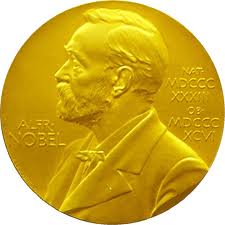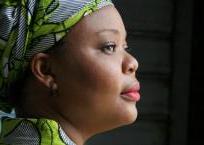London based Article 19 congratulates the joint recipients of the 2011 Nobel Peace Prize and extends particularly warm wishes to Tawakkul Karman who heads Women Journalists Without Chains, article 19’s partner in Yemen.
Absolute courage in face of danger
“Article 19 is delighted that the Nobel Peace Prize has been awarded to Karman, Johnson-Sirleaf and Gbowee, all renowned women’s rights activists. I am delighted that th e Nobel Committee has recognised the tireless work of these three women and their impact on their respective societies and continents. They are leading the way towards the transformation of post-conflict Africa and the realisation of Yemeni democratic aspirations as part of the Arab spring. Their absolute courage in the face of repression and danger, their commitment and their vision for peaceful and democratic societies are absolutely inspiring,” says Dr Agnes Callamard, Article 19 executive director.
e Nobel Committee has recognised the tireless work of these three women and their impact on their respective societies and continents. They are leading the way towards the transformation of post-conflict Africa and the realisation of Yemeni democratic aspirations as part of the Arab spring. Their absolute courage in the face of repression and danger, their commitment and their vision for peaceful and democratic societies are absolutely inspiring,” says Dr Agnes Callamard, Article 19 executive director.
“Tawakul Karman’s selection for the Nobel Peace Prize not only recognizes her relentless battle for a free press in Yemen but also highlights the free flow of information as vital for peaceful and democratic societies,” said CPJ Middle East and North Africa Coordinator Mohamed Abdel Dayem.
One of the youngest Nobel Prize recipients
One of the youngest ever recipients, the 32-year-old mother of three has been an outspoken critic of the Yemen government and a long running advocate for human rights and press freedom.
As the president of Women Journalists Without Chains she wa s an active campaigner for political prisoners and a regular organiser of demonstrations outside the parliament in the Yemen capital, Sana’a, told Iona Craig, a freelance journalist based in Sana’a, Yemen.
s an active campaigner for political prisoners and a regular organiser of demonstrations outside the parliament in the Yemen capital, Sana’a, told Iona Craig, a freelance journalist based in Sana’a, Yemen.
According to her, Karman has at times divided opinion amongst some protesters for her close ties to the conservative Islamic political opposition party, Islah, which the independent youth have sought to distance themselvs from. Her encouragement for activists to march into obvious danger and violent confrontations with the security forces has also caused controversy.
“But today’s announcement has been seen by Yemen’s demonstrators as not just a reward to Karman but a recognition of their attempts to peacefully overthrow Yemeni President Ali Abdullah Saleh and his 33-year long regime in a long running campaign that has left up to 500 protesters dead, “ said Iona Craig.
Karman – encouragement to Yemeni women
In Yemen’s deeply conservative society, where most women wear the face-covering veil of the niqab, Karman chose to unveil herself for the first time in public shortly before speaking at a human rights conference in the US.
Young female activist, Sarah Ahmed, who joined Karman’s demonstrations back in mid-January, said the Nobel laureate was, and continues to be, a huge inspiration to her and all Yemeni women.
“She gave us a glimpse of what we could achieve, of what happened in Tunisia and then Egypt. Her greatest accomplishment was breaking the fence that society builds around women. She was the first woman to break that fence, to cross the line. We no longer fear crossing that line because of her.”
Article 19’s efforts to help Yemeni civil society
Women Journalists Without Chains campaigns for the right to freedom of expression for women in Yemen. Article 19 worked with the Karman and her organisation producing the 2009 report, Yemen: an analysis of women in the media, which highlighted the poor representation of women in the Yemeni media.
Article 19 and Women Journalists Without Chains have also jointly appealed to the Yemeni government following multiple death threats to Karman because of her work. The lack of independent investigations into these threats is something the organisation strongly condemned as a dangerous step towards impunity for those who attack human rights activists.
Nobel awarded tireless women Karman was awarded the Nobel along with Liberian president, Ellen Johnson-Sirleaf, left, and Liberian activist, Leymah Gbowee, below, “for their non-violent struggle for the safety of women and for women’s rights to full participation in peace-building work”.
Karman was awarded the Nobel along with Liberian president, Ellen Johnson-Sirleaf, left, and Liberian activist, Leymah Gbowee, below, “for their non-violent struggle for the safety of women and for women’s rights to full participation in peace-building work”.
Johnson Sirleaf is the first woman to be democratically elected as President of an African country. Amnesty International in the past considered her to be a prisoner of conscience, jailed for her opposition to the ruling government in 1985.
 Johnson-Sirleaf also champions transparency, signing the first right to information law in West Africa. Liberian minister, O. Natty B. Davis, participated in Article 19’s 2010 conference which led to the London Declaration for Transparency, the Free Flow of Information and Development.
Johnson-Sirleaf also champions transparency, signing the first right to information law in West Africa. Liberian minister, O. Natty B. Davis, participated in Article 19’s 2010 conference which led to the London Declaration for Transparency, the Free Flow of Information and Development.
Gbowee mobilized women across ethnic and religious lines to help end war in Liberia and ensure women’s participation in elections there.
The Nobel Peace Prize will be awarded at a ceremony in Oslo on 10 December.
Related articles:
Sexual Minorities Uganda (SMUG) and their leader Frank Mugisha receives 2011 Rafto Prize





